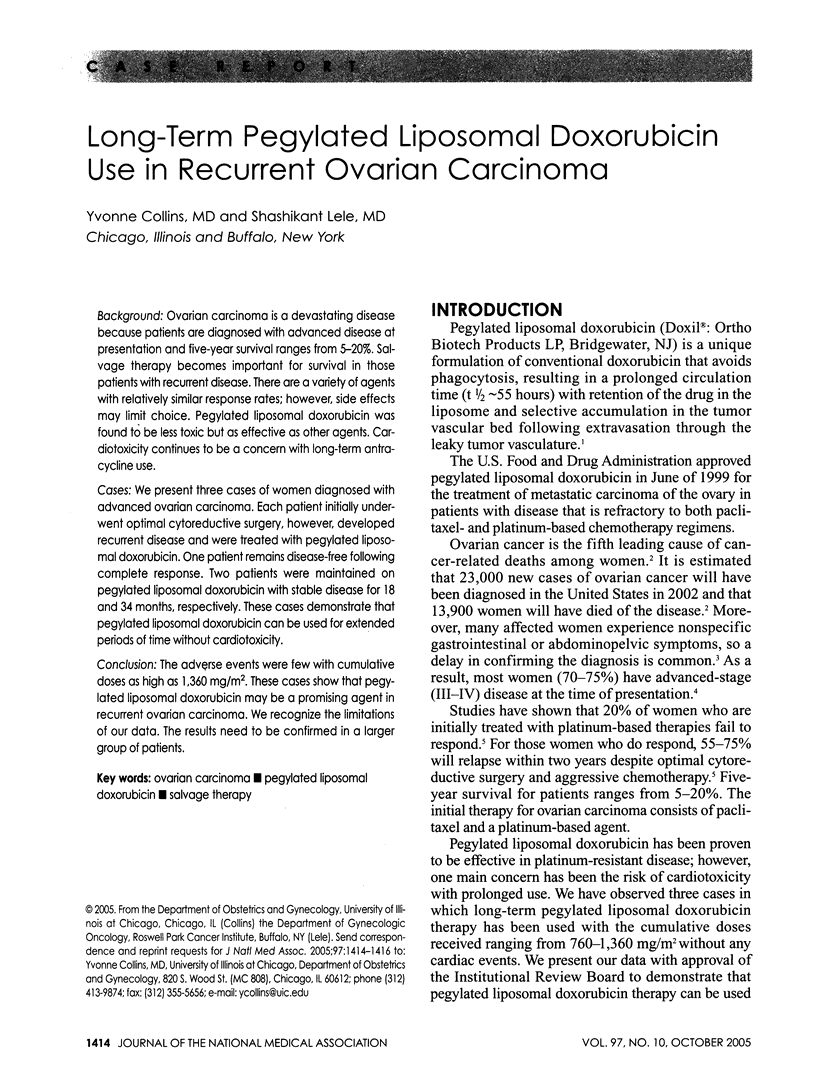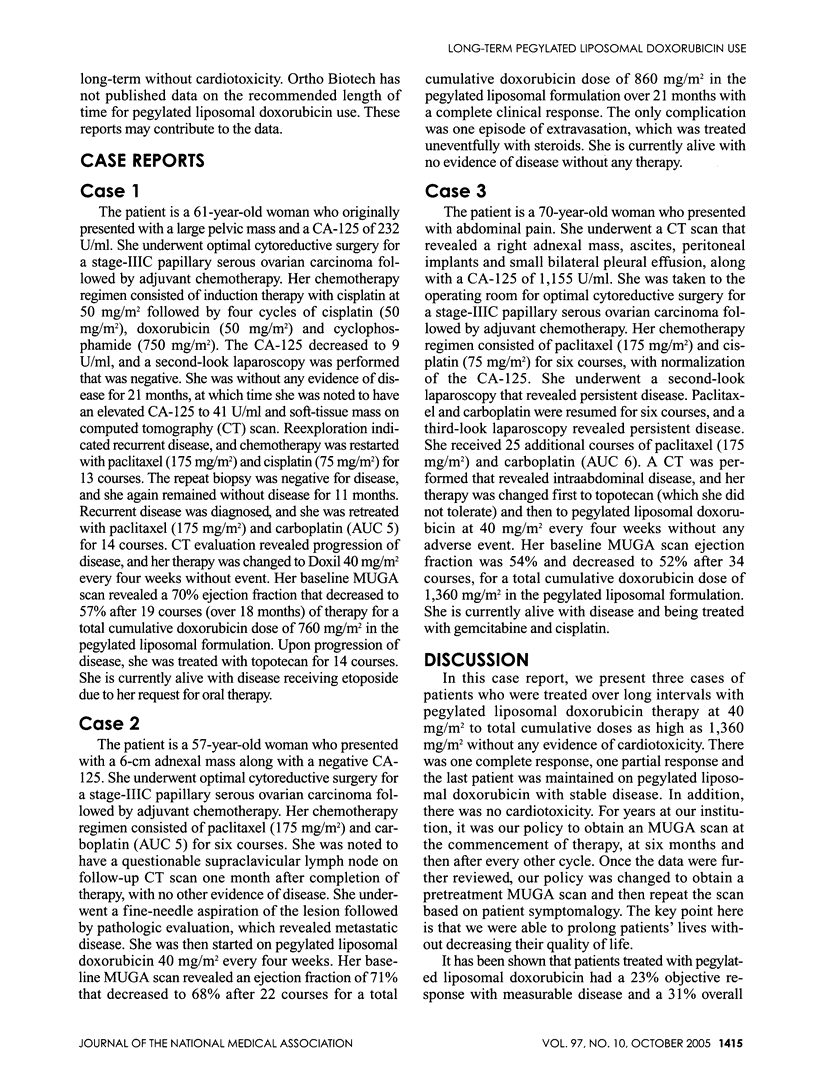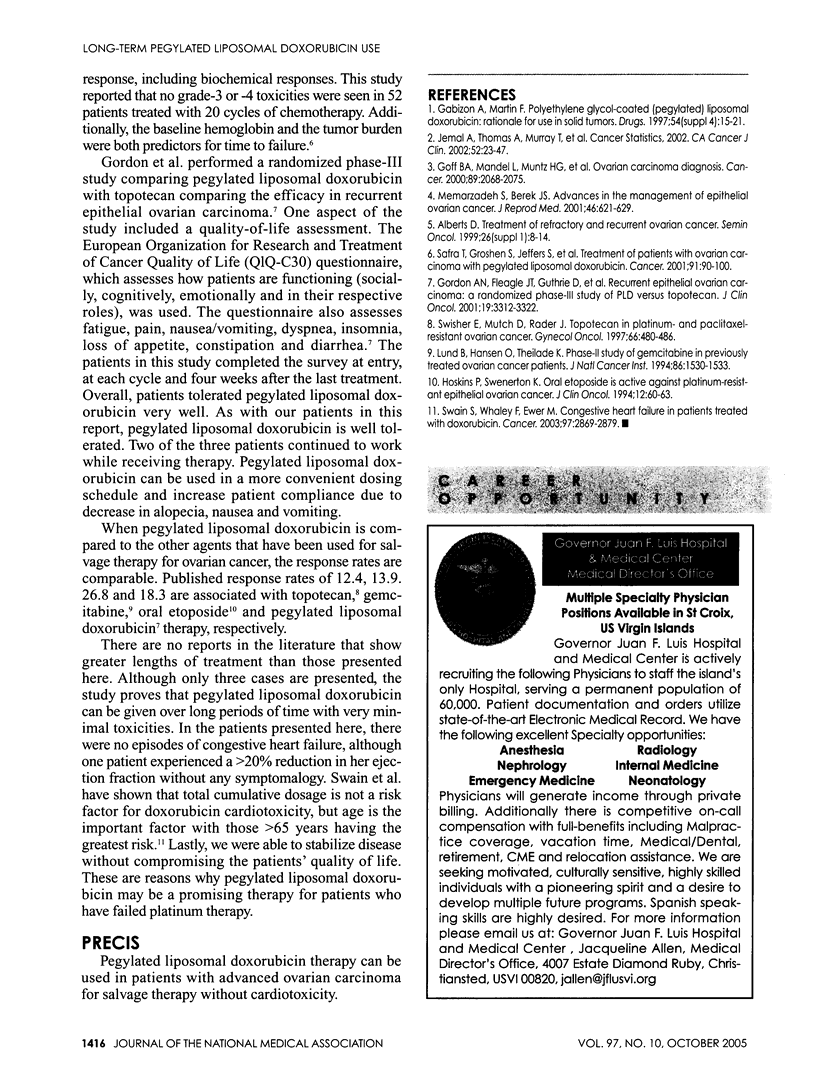Abstract
BACKGROUND: Ovarian carcinoma is a devastating disease because patients are diagnosed with advanced disease at presentation and five-year survival ranges from 5-20%. Salvage therapy becomes important for survival in those patients with recurrent disease. There are a variety of agents with relatively similar response rates; however, side effects may limit choice. Pegylated liposomal doxorubicin was found to be less toxic but as effective as other agents. Cardiotoxicity continues to be a concern with long-term antracycline use. CASES: We present three cases of women diagnosed with advanced ovarian carcinoma. Each patient initially underwent optimal cytoreductive surgery, however, developed recurrent disease and were treated with pegylated liposomal doxorubicin. One patient remains disease-free following complete response. Two patients were maintained on pegylated liposomal doxorubicin with stable disease for 18 and 34 months, respectively. These cases demonstrate that pegylated liposomal doxorubicin can be used for extended periods of time without cardiotoxicity. CONCLUSION: The adverse events were few with cumulative doses as high as 1,360 mg/m2. These cases show that pegylated liposomal doxorubicin may be a promising agent in recurrent ovarian carcinoma. We recognize the limitations of our data. The results need to be confirmed in a larger group of patients.
Full text
PDF


Selected References
These references are in PubMed. This may not be the complete list of references from this article.
- Alberts D. S. Treatment of refractory and recurrent ovarian cancer. Semin Oncol. 1999 Feb;26(1 Suppl 1):8–14. [PubMed] [Google Scholar]
- Gabizon A., Martin F. Polyethylene glycol-coated (pegylated) liposomal doxorubicin. Rationale for use in solid tumours. Drugs. 1997;54 (Suppl 4):15–21. doi: 10.2165/00003495-199700544-00005. [DOI] [PubMed] [Google Scholar]
- Goff B. A., Mandel L., Muntz H. G., Melancon C. H. Ovarian carcinoma diagnosis. Cancer. 2000 Nov 15;89(10):2068–2075. doi: 10.1002/1097-0142(20001115)89:10<2068::aid-cncr6>3.0.co;2-z. [DOI] [PubMed] [Google Scholar]
- Gordon A. N., Fleagle J. T., Guthrie D., Parkin D. E., Gore M. E., Lacave A. J. Recurrent epithelial ovarian carcinoma: a randomized phase III study of pegylated liposomal doxorubicin versus topotecan. J Clin Oncol. 2001 Jul 15;19(14):3312–3322. doi: 10.1200/JCO.2001.19.14.3312. [DOI] [PubMed] [Google Scholar]
- Hoskins P. J., Swenerton K. D. Oral etoposide is active against platinum-resistant epithelial ovarian cancer. J Clin Oncol. 1994 Jan;12(1):60–63. doi: 10.1200/JCO.1994.12.1.60. [DOI] [PubMed] [Google Scholar]
- Jemal Ahmedin, Thomas Andrea, Murray Taylor, Thun Michael. Cancer statistics, 2002. CA Cancer J Clin. 2002 Jan-Feb;52(1):23–47. doi: 10.3322/canjclin.52.1.23. [DOI] [PubMed] [Google Scholar]
- Lund B., Hansen O. P., Theilade K., Hansen M., Neijt J. P. Phase II study of gemcitabine (2',2'-difluorodeoxycytidine) in previously treated ovarian cancer patients. J Natl Cancer Inst. 1994 Oct 19;86(20):1530–1533. doi: 10.1093/jnci/86.20.1530. [DOI] [PubMed] [Google Scholar]
- Memarzadeh S., Berek J. S. Advances in the management of epithelial ovarian cancer. J Reprod Med. 2001 Jul;46(7):621–630. [PubMed] [Google Scholar]
- Safra T., Groshen S., Jeffers S., Tsao-Wei D. D., Zhou L., Muderspach L., Roman L., Morrow C. P., Burnett A., Muggia F. M. Treatment of patients with ovarian carcinoma with pegylated liposomal doxorubicin: analysis of toxicities and predictors of outcome. Cancer. 2001 Jan 1;91(1):90–100. [PubMed] [Google Scholar]
- Swain Sandra M., Whaley Fredrick S., Ewer Michael S. Congestive heart failure in patients treated with doxorubicin: a retrospective analysis of three trials. Cancer. 2003 Jun 1;97(11):2869–2879. doi: 10.1002/cncr.11407. [DOI] [PubMed] [Google Scholar]
- Swisher E. M., Mutch D. G., Rader J. S., Elbendary A., Herzog T. J. Topotecan in platinum- and paclitaxel-resistant ovarian cancer. Gynecol Oncol. 1997 Sep;66(3):480–486. doi: 10.1006/gyno.1997.4787. [DOI] [PubMed] [Google Scholar]


